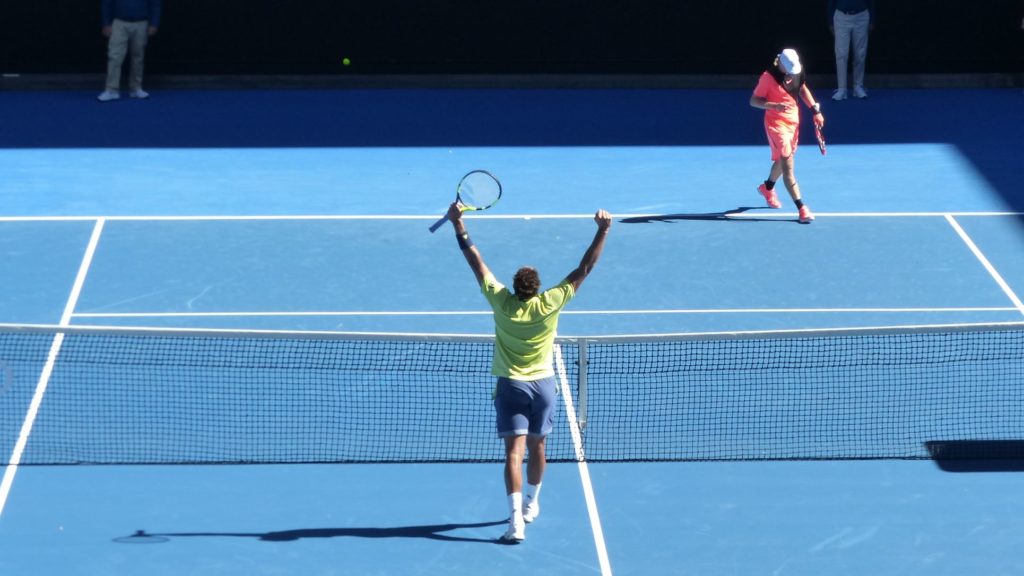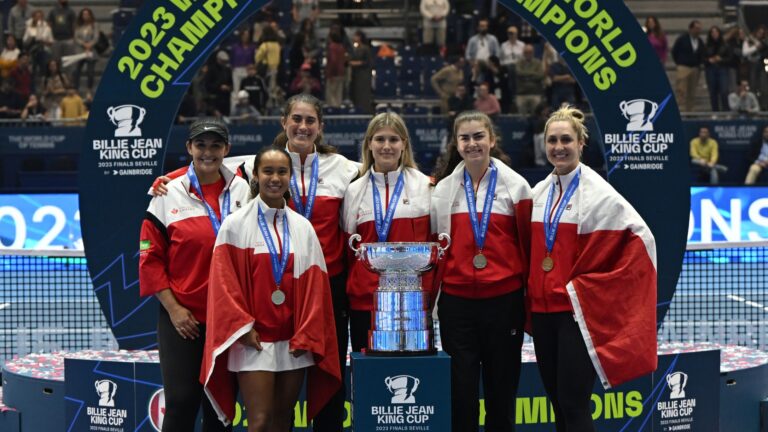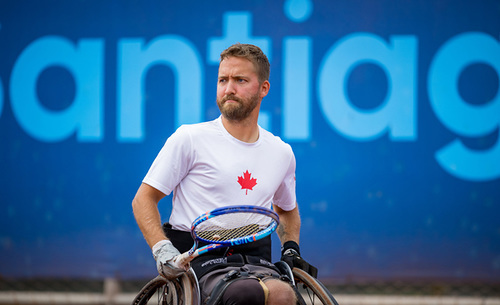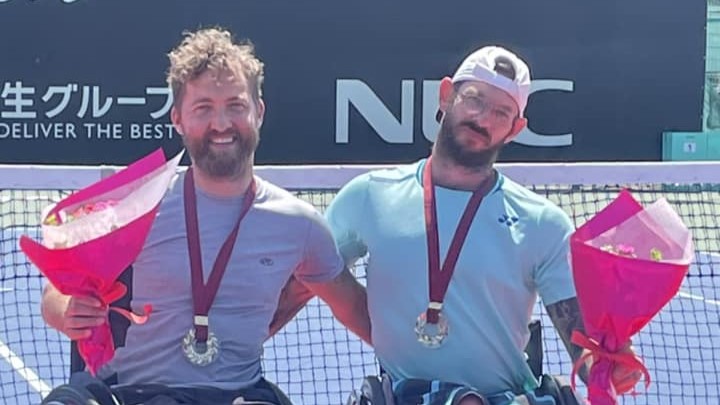
For almost all of his second-round 3-6, 6-3, 1-6, 7-6(4), 7-5 victory over Denis Shapovalov at the Australian Open on Wednesday, Jo-Wilfried Tsonga was the second-best player on the court in Margaret Court Arena.
He missed sitter volleys in games he was broken, he double-faulted and made poor choices about Hawk-Eye challenges, he returned poorly, his shot selection was questionable and he foot-faulted at least four times. Shapovalov, at 18, played more disciplined, willful tennis than the man 14 years his senior. Leading 5-2 – with one service break – in the fifth set, it was hard to see anyone but the explosive lefthander from Richmond Hill, Ont., winning the match.
But the old sports cliché about having to run right through the tape wound up applying at the end of a three-hour and 37-minute ‘stoush’ (Aussie slang for a good tussle) in heat reaching 31 degrees.
“There were two phases,” Tsonga said afterward about the match, “the last ten minutes and the rest. I suffered, there’s no other way to put it. It was tough in the head because physically it was tough – brutal heat in the middle of the afternoon. Not many players like playing in those conditions. Those last 10 minutes are why I fought hard for three hours and 20 minutes – to be able to enjoy those moments.”
Total points are not always a measure of a match but Shapovalov won 160 to 153 for Tsonga – and that’s with losing 19 of the last 23 points (and two service games) over the final five games.
Whether it was nerves or fatigue, there’s no question he had a drop-off after breaking Tsonga to lead 2-0 followed by holding serve to 3-0 and having a break point to lead 4-0. Unforced errors crept into his game and when he served for the match at 5-3 he started with two backhand unforced errors, won a point, double-faulted and then lost the game as a re-energized Tsonga took it to him and put away a backhand volley.
Two games later there was another double fault and eventually Tsonga broke again – from deuce when Shapovalov made consecutive forehand errors. Tsonga had the ultimate break and proceeded to serve out the match to love.
There’s no question Tsonga had begun to play much better but he definitely got help from Shapovalov who wasn’t able to maintain the quality of play that got him into such a strong winning position.
“There’s always nerves in a tennis match,” he said post match. “It’s a sport. I wasn’t thinking about it much. (I) just didn’t play a good game (ninth game, fifth set) on my serve. Then he picked up his level.”
It was a gut-wrenching loss but Shapovalov managed to maintain a positive perspective. “As much as the loss hurts,” he said. “I don’t find it as a loss. I find it as an opportunity to learn. Yeah, I mean, I’m turning it into a positive. Hopefully next time I’m in this situation I play things a little bit differently.”
“But I’m the type of guy when things don’t go my way, instead of sulking or getting mad, down on myself, I go back on the court and try to work twice as hard so next time when I’m in that position I can hit some good serves – just close out the match.”
Tsonga, who certainly had his moments of frustration, was asked if he felt like he was playing an 18-year-old. “When you’re actually playing you don’t think about that,” he said. “The only time was when I wanted to motivate myself and I said quote unquote ‘he’s young and maybe when it comes time to finish off the match he might make some poor choices.’ That was just to keep myself going. But it was the only time I thought of him as 18 years old.”
Channel Seven commentator John Fitzgerald, a former world no. 25 (1988) and Australian Davis Cup captain from 2001 to 2010, was sympathetic about Shapovalov’s inability to hold his nerve in the crucial last stages of the match. “Look it happens,” he said. “A young kid, he tried to serve it out and he’s up against a lot of experience.”
The 57-year-old Melbournian is a Shapovalov admirer. “I was really impressed with him in every way – he was so gracious at the end too,” Fitzgerald said, “it was quite enlightening. When he shook hands, when he left the court he stopped and signed autographs. He did a good job. He’s a talent – he’s great. Good for the sport. He’s going to be terrific.”
On the stat sheet, it was Shapovalov’s numbers that were dominant even against a player as offensive-minded as Tsonga. He was 60/51 in the winners to unforced errors ratio while the Frenchman was 50/47.
Critiquing his own performance, Shapovalov said, “I thought I could have returned better. There were a couple games where I was getting a lot of looks on the second serve and just shanking a couple – not doing enough with the ball. That’s definitely one area I still want to improve.”
“The other part I would say is my volleys. I think I’m volleying a lot better. Still sometimes I’m not setting on my feet. I’m going for too much. I think it’s just going to the net more, having these chances to play more volleys.”
About what his plans are now, he said, “I might go to Toronto to visit my parents and my dogs. But I’m not sure yet. I might stop by there, go to Montreal a couple days, train before Davis Cup on clay, (then) head over to Croatia.”
The first round World Group tie against a Croatian squad led by no. 6-ranked Marin Cilic and no. 46 Borna Coric will be played indoors on clay in Osijec from Feb 2-4.
“It’s going to be interesting,” Shapovalov said. “I don’t think I’ve ever played a tournament or matches on indoor clay. If we play well, we can take it, definitely. Hopefully Felix (Auger-Aliassime) will be healthy enough for the tie. I don’t see why we can’t win it.”
Despite Wednesday’s loss, on balance it’s been a successful first Australian swing for Shapovalov – it’s disappointing and annoying that veteran umpire Fergus Murphy spent the whole match mispronouncing his name as Sha-POV-alov instead of Shapo-VAL-ov.
Shapovalov played well in an extremely competitive first round in Brisbane before losing 6-7(5), 7-6(4), 6-4 to an in-form Kyle Edmund. In Auckland, he outplayed Rogerio Dutra Silva 6-3, 6-2 in the first round before running into a red-hot – 6-2, 6-4 – Juan Martin del Potro in the second. And in the first round at the Australian Open he outclassed old junior rival Stefanos Tsitsipas 6-1, 6-3, 7-6(5).
On Wednesday, he pushed Tsonga, a finalist at the Aussie Open ten years ago and one of the top players in the world over the past decade, to five exceedingly close sets.
Though it was a disappointing loss, the 18-year-old continues to progress and show he’s not at all out of place with the best in the game.
BOUCHARD OPPONENT CONCERN
There appears to be legitimate doubt about the fitness of top seed Simona Halep ahead of her second-round match with Genie Bouchard on Thursday – first match at 7 p.m. (3 a.m ET Wednesday in Canada) in Margaret Court Arena.
Halep rolled her left ankle in her opening match on Tuesday and, according to a Romanian reporter, she apparently practiced very cautiously for only 20 minutes on Wednesday. She had some sort of extra support or brace on the ankle and simply hit forehands and backhands standing in place with minimal movement. She did not hit any serves.
The winner of the second round match will face either Andrea Petkovic of Germany or Lauren Davis of the USA in round three on Saturday.
THE DOUBLES DAY
In an opening round women’s doubles match, Genie Bouchard and Sloane Stephens were beaten 6-4, 6-4 by no. 2 seeded Russians Ekaterina Makarova and Elena Vesnina.
The match last an hour and 22 minutes before a packed crowd around outside Court 12. Breaks by Makarova and Vesnina of the Stephens serve at 4-all in the first set and of the Bouchard serve at 4-all in the second proved to be the difference in the match.
In men’s doubles, Daniel Nestor and partner Jonathan Erlich of Israel lost 7-6(4), 6-3 to Hyeon Chung of Korea and Radu Albot of Moldova in a first-round match played on Court 15.
Nestor and Erlich led 4-2 in the first set with a chance for 5-2 but then Chung and Albot took over and dominated the match.
It will likely be the 45-year-old Nestor’s last Australian Open – he won his only men’s doubles title at Melbourne Park in 2002 alongside Mark Knowles of the Bahamas.
AUSTRALIAN POST CARD
Many of us are city dwellers these days so we don’t get to hang our laundry out to dry. One of the joys of Australia for this city slicker is a friend’s clothesline where he can hang things out in the fresh air and hot sun of the antipodean summer.









